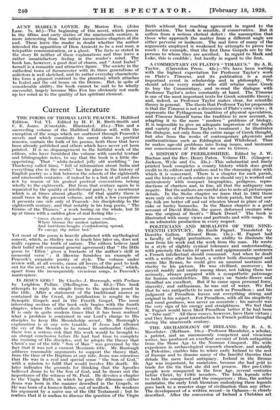POLITICIANS AND MORALISTS OF THE NINE- TEENTH CENTURY. By Emile
Faguet. Translated by Dorothy Galton. (Ernest Benn. 15s.)—M. Faguet had a faculty of bright portraiture, an ability to illustrate the man from his work and the work from the man. He wrote in a style of slightly cynical tolerance and understanding, with precisely the turns of speech and epigrammatic sentences a French intellectual should command. And when he dealt with a writer after his heart, a writer both disecairaged and warm like Renan, he could give an unusual neatness and clarity to his picture. He was civilized, moreover; he moved readily and easily among ideas, not taking them too seriously, always prepared with a sympathetic. patronage for human eccentricities. His essays on Sainte-Beuve and Stendhal, are excellent. But if he came upon personal foree sincerity, and enthusiasm, he was out of water. We feel that he was antipathetic to men Such as Proudhon ; and his ' judgment of Proudhon leaves out everything strong and original in his subject. For Proudhon, with all his simplicity and rural goodness, was never an eccentric ; his naïveté was the very sign of his energy and straightness. . We' feel that M. Faguet would have liked Proudhon better if he had been a " false naïf." All these essays, however, have their virtues ; and they form a good introduction to French political thought during the nineteenth century.






































 Previous page
Previous page